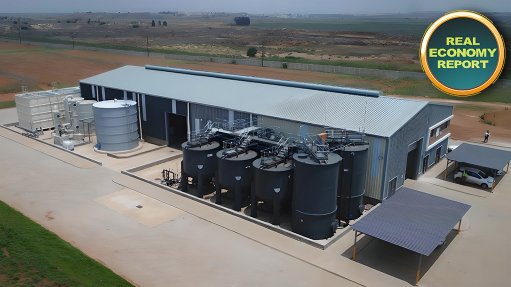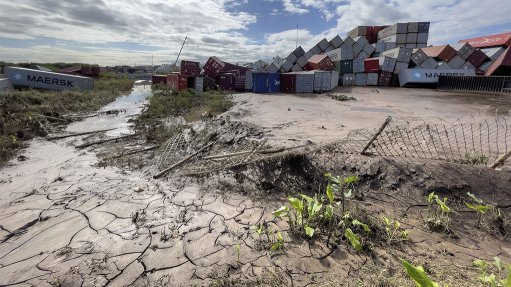COP27 Summit: Plastic industry calls for evidence-based decisions as nation grapple to fight climate change
This article has been supplied as a media statement and is not written by Creamer Media. It may be available only for a limited time on this website.
The 27th Conference of the Parties of the United Nations Framework Convention on Climate Change (COP27) that has just drawn to a close in Egypt, once again placed a strong emphasis on climate change and the importance of making the shift from pledging to implementing transitionary plans.
In his speech delivered at the UN Climate Change Conference 2022, President Cyril Ramaphosa highlighted the importance of discussions focussing on the health and well-being of the most vulnerable (in South Africa and around the world) and working towards securing food and water security for these nations.
Plastics SA Executive Director Anton Hanekom says the outcomes of COP27 reveal that now, more than ever, the private sector has an important role to play when it comes to leading the charge and pushing for what the planet needs.
“We believe that plastics continue to play a vital role in our modern society. Aside from the many benefits derived from its value in the storage and transportation of food items, plastics also play an important role in job creation and economic expansion. For this reason, we echo our President’s sentiments that any decision to move away - whether to alternative forms of energy or from single-use plastic packaging - must strongly be based on evidence and take place with special consideration to both the livelihood of workers and the impact such alternatives will have on the environment,” Anton urges. He cautions that if we don't address the root cause of plastic pollution, it could result in new and more complicated problems as we shift the problem from one material to many others.
“When choosing an alternative to plastics in the hope of reducing our carbon footprint, careful regard must be given to ensure that the replacement materials are economical, recyclable, and suitable for their intended use. Africa, and South Africa in particular, differ from the rest of the world in terms of the socio-economic challenges we face. Our waste collection and manual recycling processes are also unique. The plastic waste management solutions that are being proposed by developed and wealthier countries can therefore not easily be applied to the local context,” he says.
Globally, the plastics industry advocates that the negative impacts plastics have on the environment relate to the responsibility, or lack thereof, with which we make use of this versatile material. Extended producer responsibility (EPR), the implementation of a circular economy, and the focus to re-use, refill, and use more recycled content in products to reduce plastic pollution, are all trends that are influencing the plastics industry landscape. These developments are consistent with international initiatives such as the Sustainable Development Goal 14: Life Below Water, which addresses ocean issues by implementing measures to reduce marine pollution, end illegal and overfishing, and invest in gaining scientific knowledge and marine technology.
During the COP26 Summit which was held in Glasgow last year, reductions in coal use were pledged. Several nations attempted to phase out the use of all fossil fuels this year, but this ultimately resulted in a failed resolution. Nevertheless, efforts to gradually reduce the use of coal will continue.
Since plastic is a by-product of the South African coal-to-fuel conversion process, Anton acknowledges that this could potentially have a negative effect on plastic production. However, he points out that despite the negative connotations associated with plastic production, when used and recycled properly, plastic remains one of the lowest carbon footprint building materials.
“If re-used and recycled correctly, plastics play a major role in lowering the carbon footprint of our country. With all the talks around climate change and the direction that COP 27 has hoped to pursue, the importance of climate finance cannot be overlooked in African countries that are still so strongly feeling the effects of Covid-19. Aside from the job creation that the plastics industry provides to so many individuals, talks around climate change need to include the financial support that will allow South Africa to successfully implement strategies for the re-use and recycling of plastic to avoid detrimental environmental and climate effects. South Africa’s plastics industry is the largest of its kind in sub-Saharan Africa, converting over 1.84-million tons of locally produced and imported polymers (virgin and recycled). The best way to mitigate these challenges is not by eliminating single-use plastics, but by encouraging responsible use throughout the value chain,” Anton concludes.
Comments
Announcements
What's On
Subscribe to improve your user experience...
Option 1 (equivalent of R125 a month):
Receive a weekly copy of Creamer Media's Engineering News & Mining Weekly magazine
(print copy for those in South Africa and e-magazine for those outside of South Africa)
Receive daily email newsletters
Access to full search results
Access archive of magazine back copies
Access to Projects in Progress
Access to ONE Research Report of your choice in PDF format
Option 2 (equivalent of R375 a month):
All benefits from Option 1
PLUS
Access to Creamer Media's Research Channel Africa for ALL Research Reports, in PDF format, on various industrial and mining sectors
including Electricity; Water; Energy Transition; Hydrogen; Roads, Rail and Ports; Coal; Gold; Platinum; Battery Metals; etc.
Already a subscriber?
Forgotten your password?
Receive weekly copy of Creamer Media's Engineering News & Mining Weekly magazine (print copy for those in South Africa and e-magazine for those outside of South Africa)
➕
Recieve daily email newsletters
➕
Access to full search results
➕
Access archive of magazine back copies
➕
Access to Projects in Progress
➕
Access to ONE Research Report of your choice in PDF format
RESEARCH CHANNEL AFRICA
R4500 (equivalent of R375 a month)
SUBSCRIBEAll benefits from Option 1
➕
Access to Creamer Media's Research Channel Africa for ALL Research Reports on various industrial and mining sectors, in PDF format, including on:
Electricity
➕
Water
➕
Energy Transition
➕
Hydrogen
➕
Roads, Rail and Ports
➕
Coal
➕
Gold
➕
Platinum
➕
Battery Metals
➕
etc.
Receive all benefits from Option 1 or Option 2 delivered to numerous people at your company
➕
Multiple User names and Passwords for simultaneous log-ins
➕
Intranet integration access to all in your organisation





















